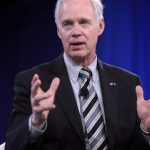AP Photo/Charlie Neibergall
- Sarah Palin was a major Republican kingmaker in the years following her 2008 VP candidacy.
- But now that she’s seeking a comeback, GOP senators who she endorsed are holding their tongues.
- Even Ted Cruz, who once said he “would not be in the US Senate today” if it weren’t for Palin, demurred.
Former Alaska Gov. Sarah Palin was once something of a kingmaker in Republican politics, lending her endorsement to dozens of candidates, serving as a leader of the “Tea Party” movement, and arguably laying the groundwork for the rise of Donald Trump to the White House.
But now that Palin’s attempting a political comeback of her own — unexpectedly launching a campaign for the special election to fill the at-large Alaska House seat left by the late Rep. Don Young — many of the Republican senators she helped to elevate told Insider at the Capitol that they aren’t yet sure if they’ll return the favor.
“Well, I think that’ll be up to the people of Alaska,” said Sen. Joni Ernst who was endorsed by and campaigned with Palin when the Iowa Republican ran for the Senate in 2014. “I don’t know who else is running, and I would want to know.”
Following her elevation to the national stage in 2008 as the late Sen. John McCain’s running mate, Palin became a star among the Republican base, with conservative voters responding to her populist persona. Even after resigning from the governorship in 2009, launching a political action committee, flirting with presidential campaigns, and launching a career in right-wing media, she became a sought-after endorsement on the right, particularly amid the explosion of the “Tea Party” movement in the early years of the Obama administration.
The Washington Post even created a website to track which candidates she’d endorsed.
“You know what? She can pick winners,” said Republican Sen. Ted Cruz of Texas in a fiery introduction of Palin at the Conservative Political Action Conference in 2013 that included the admission that he’s “not remotely cool enough to be Sarah Palin.”
“I would not be in the US Senate today if it were not for Governor Sarah Palin,” Cruz said at the time.
Palin endorsed Cruz in his hotly-contested 2012 Republican Senate primary, even traveling to Texas to rally with him. He ultimately prevailed over Texas Lt. Gov David Dewhurst, who had the backing of most of the state’s Republican establishment.
But when Insider asked Cruz at the Capitol whether he would be endorsing Palin, he repeatedly declined to comment either way.
“Call my press office,” Cruz told Insider three times on Tuesday and again on Wednesday. Neither his Senate office nor his campaign responded when Insider followed up about Cruz’s position on Palin.
Palin famously threw her weight behind Trump — rather than Cruz — during the 2016 presidential campaign ahead of the crucial Iowa Caucuses. It was a blow to Cruz’s Tea Party-centric campaign and an early indication that traditional conservatives were open to Trump’s candidacy regardless of all the scandals that followed him.
Trump, citing the significance of that endorsement, opted to return the favor on Sunday. “Sarah shocked many when she endorsed me very early in 2016, and we won big,” the former president said in his endorsement statement. “Now, it’s my turn!”
A diminished figure
AP Photo/Carolyn Kaster
With roughly 50 candidates competing to make it past Alaska’s June 11 “jungle primary” — a product of the state’s newly-enacted ranked-choice voting system — Palin may benefit from both her name recognition and Trump’s endorsement in the largely conservative state.
But recent polling has also found that just 31% of Alaskans had a favorable view of her, and recent reports have indicated that she has had little presence within Alaska politics as of late.
“This is your own kind of bubble,” Sen. Lisa Murkowski, a Republican of Alaska, told Insider on Tuesday. Murkowski, who has a colorful history with Palin, insisted that “Alaskans are talking about” the other candidates more than Palin.
And even nationally, Palin’s star power has largely been supplanted by Trump and a new crop of MAGA figures.
Indeed, Palin has most recently generated headlines for appearing on “The Masked Singer,” violating New York City’s indoor dining vaccination rules and then showing up to the same restaurant again with an active COVID-19 case, and losing a defamation lawsuit against the New York Times.
It’s a far cry from the power she used to hold.
In 2010, as now-Sen. Tim Scott of South Carolina faced a Republican primary runoff election against the son of segregationist senator Strom Thurmond, Palin lent Scott her endorsement. Politico described it as a “coup” for Scott at the time. She later endorsed his 2014 Senate bid after then-Gov. Nikki Haley appointed Scott to the seat in 2012.
But when asked at the Capitol whether he planned to endorse Palin, Scott immediately motioned to an aide who was walking with him. “You can send an email,” she said.
Insider then asked Scott twice whether he had any comment as he waited for a Senate subway door to close, leaving him to stare silently ahead for several seconds. “We don’t do hallway interviews,” his aide added.
Despite Insider’s outreach to the aide through both an official email and a private Gmail account she provided, Sen. Scott ultimately did not respond to Insider’s inquiry.
Haley, another GOP figure who owes some of her own political fortune to Palin, has already declared her support for Palin’s comeback.
—Nikki Haley (@NikkiHaley) April 3, 2022
In 2012, Deb Fischer of Nebraska sought out Palin’s endorsement as she waged her first campaign for US Senate against two well-known and better-funded candidates.
“I am writing to you as both a fan of your strong, conservative principles and as a fellow female Republican,” Fischer wrote to Palin, according to Roll Call. “I have watched your career with respect as you take on tough issues, all while raising a family and serving your great state. Your career has inspired me and so many other female politicians who believe principles should be above politics.”
Fischer ultimately won that primary, a victory that was partially attributed to Palin’s endorsement. A decade on, the Nebraska Republican didn’t rule out endorsing her one-time mentor, but she also showed little enthusiasm for Palin’s new campaign.
“I haven’t been following the race,” Fischer told Insider. “I saw she announced, and there are a number of other people, too.”
“It’s another state, I don’t [endorse] that often, especially for a House race. I look at Senate races,” Fischer added.
And in 2014, Fischer and Palin even traveled to Iowa to campaign for Ernst, who was often compared to Palin due to both her backing from the former Alaska Governor and for a Palin-esque campaign ad called “Squeal” that garnered national attention.
“I think it’s gonna be fabulous if we have another conservative woman serving in the House,” Ernst said when Insider pointed out the history between her and Palin. She said she hadn’t yet had time to think about whether to endorse Palin, but said she’s “not ruling it out at all.”
Republican Sens. Ben Sasse of Nebraska and Mike Lee of Utah — one-time allies and endorsees of Palin — also did not respond to requests for comment sent to both their Senate and campaign offices.
Ultimately, the only senator who unambiguously told Insider that they would endorse Palin was Sen. Rand Paul, a Republican of Kentucky, who called her the “de facto leader of the Tea Party” after she endorsed his 2010 Senate campaign.
“She was an early endorsement, and it was a big help to my primary,” Paul said. “I support her policies, and I think we have a lot in common.”
He also added that his campaign staff was still working with hers to roll out a formal endorsement. “Now you’ve got an announcement before the announcement,” he quipped.
Powered by WPeMatico






